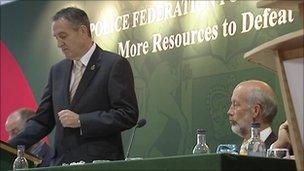Police Federation backs 50-50 recruitment
- Published

The union which represents police officers in Northern Ireland has signalled it would support the extension of the controversial 50-50 recruitment process to combat the dissident republican threat.
The Police Federation claims that at least 1,000 extra officers are needed.
Tackling the threat from dissident republicans was top of the agenda at its conference.
Claiming that the police are almost at breaking point, Police Federation chairman Terry Spence had strong words of advice for Justice Minister David Ford.
"Minister, let me leave you in no doubt: we are rapidly approaching a stage which can either become the point of no return, or the opportunity to be seized which will end a terrorist campaign before it gets fully under way," he said.
"The PSNI needs at least another 1,000 officers to end terrorism.
"Two hundred could come from the existing police Full Time Reserve and a further 800 through current recruitment procedures."
The current 50-50 recruitment process was introduced to increase the numbers of Catholics joining the police.
Due to end next year, the scheme has been strongly opposed by unionist politicians.
Mr Spence's comments are therefore significant, with him clearly signalling that the Police Federation would support its extension if funding is available for additional officers.
This seems unlikely in today's financial climate, but discussions are taking place about the police budget, the threat posed by dissidents and police numbers.
While Chief Constable Matt Baggott would undoubtedly like more officers, publicly, he rejects claims that the PSNI is overstretched.
"I have been very clear that we are not at breaking point," he said.
'Security situation'
Mr Baggott said his budget needed to be maintained at its current level.
"There may be some areas where I'd want to improve our capability, particularly in tackling the security situation," he said.
"I want more freedom in being able to reinvest savings we make by tackling bureaucracy into the frontline, but I'm not going to get stuck into any figures."
DUP assembly member Jimmy Spratt said "trading off extra money or resources against continuing anti-Protestant discrimination" would be "utterly immoral".
"50-50 was an outrageous and discriminatory means of recruiting officers in to the police.
"Anyone who believes in fairness and equality welcomed the news that 50-50 recruitment is to be abolished," he said.
Mr Ford attended the Police Federation conference to talk about policing, but also found himself facing questions about prisons.
The report into the murder of Billy Wright published on Tuesday recommended a radical, Patten-style overhaul of the prison service, and the Secretary of State will discuss the proposal with the justice minister next week.
The problem is that the Patten process involved generous redundancy payments for RUC officers that cost millions of pounds.
So is a similar process a realistic possibility for prisons?
Mr Ford said: "I notice that while there may be references to a Patten-style report, there is no reference to any question of funding on the scale of Patten.
"What we are seeking to do is make quite significant reforms to the Prison Service but recognise that we do not have the same options that Patten did."
Mr Ford has promised prison reform, but with many competing demands for limited funding, it's clear that tough decisions lie ahead.
- Published4 February 2010
- Published22 April 2010
- Published22 July 2010
- Published28 April 2010